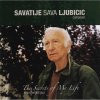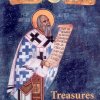A great man is one who collects knowledge the way a bee collects honey and uses it to help people overcome the difficulties they endure - hunger, ignorance and disease!
- Nikola Tesla
Remember, remember always, that all of us, and you and I especially, are descended from immigrants and revolutionists.
- Franklin Roosevelt
While their territory has been devastated and their homes despoiled, the spirit of the Serbian people has not been broken.
- Woodrow Wilson
People Directory
Savatije Sava Ljubicic
Savatije Sava Ljubicic [Savatije Sava Ljubičić, Саватије Сава Љубичић], highly acclaimed Yugoslav composer, was born in 1931, in Cacak, Serbia. He comes from a well known family of musicians with Savatije Ljubicic being the only family member to be a composer. His first musical training began at the age of three when he was at his father’s music school. While listening to the Serbian country songs and dances, he was taught how to play the accordion. His father Miloje Ljubicic, also known as one of Serbia’s best flute builders, opened the music school in Cacak in order to teach farmers’ young children how to be able to play, appreciate and enjoy the Serbian country music its rich folklore The school was opened in 1933, the year when Ljubicic’s father as a singer and accordion player wins the highest award given to outstanding vocalists and musicians in former Yugoslavia. . Read more ...Publishing
Treasures New and Old
Writings by and about St. Nikolai Velemirovich
Before us is a book about a theologian, a minister, a missionary, a writer, a poet, an apostle, a saint, a man of dialogue: this book is about St. Nikolai Velimirovic, Bishop of Ohrid and Zhicha (1880 - 1956), who along with his many other attributes is regarded, with good reason, as an Enlightener of the Americas, The renewed interest in this man and his works has resulted in the materialization of this book for English-speaking readers who wish to become acquainted with this extraordinary person. The collected texts provide an extensive over view of his life, present important testimonies about his personality, and offer essential insights into his theology. The authors penetrate the depths of his thought with remarkable precision and also elucidate his actions. The authros agree that the appearance of Nikolai Velimirovich marks an era of change in the ecclesiastical and theological paradigm as a result of his spirituality, ecclsiastical work, and theological position.
Latest US News
- Волт Богданић: Американац српског порекла добитник три Пулицерове награде за истраживачко новинарство
- The American Srbobran - Building a Partnership with the Library of Congress and Institutions in Serbia
- „Американски Србобран“ унапређује сарадњу са Конгресном библиотеком у Вашингтону и институцијама у Србији
- Преминуо чувени амерички песник српског порекла Чарлс Симић
- Јован Дучић међу великанима у кливлендској башти
- Србија, Африка, Америка и Канада славе дан Теслиног рођења
- Документарац Немање Станковића приказан у Холивуду
- Tesla Rhapsody
- Saved by Beauty: Dostoevsky in New York
- Izložba likovnih radova o Dostojevskom
- Steve Popovich - the man who discovered Meat Loaf
- Odlazak čoveka koji je mnogo uradio za očuvanje sećanja na lik i delo Nikole Tesle
- Naš otac Balkanac za Ruse je smislio bijelu Coca-Colu
- Neverovatan poduhvat srpske pravoslavne zajednice u Americi
- Prva Srpkinja u finalu najveće evropske nagrade za pronalazače
Latest Serbia News
- На Станфорд листи 15 крагујевачких научника
- Naše postojanje skriva mračne i svetle strane, i veliko je umeće prepoznati ih i razlučiti
- Српска застава је најлепша на свету – на основу резултата анкете милион људи
- Недеља америчке културе
- Preminuo pisac Aleksandar Petrov
- Spomenik Branku Pešiću radiće srpski vajar iz Los Anđelesa
- Metropolitan Amfilohije buried in the Cathedral church in Podgorica
- Memorial prayer rite for Metropolitan Amfilohije in the Cetinje Monastery
- На данашњи дан рођен је Михајло Идворски Пупин
- Алекса је стигао до Принстона, али Математичкој гимназији се радо враћа
- Каубој православац и 40 Американаца посетили Косово
- Архив Војводине: Сведочанства времена у спомен на херојске претке
- Премијера „Теслиног народа“ на Коларцу
- Када се велики умови играју науком о подацима
- Američka vojska donirala je vrednu opremu klinici u Nišu



